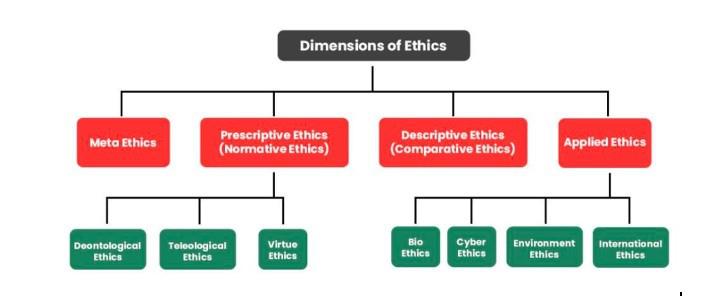Mains Daily Question
Nov. 2, 2023
Q1. What are the various dimensions of ethics? According to you, which of them is the most important determinant for ushering in Good Governance. Illustrate with example. (10M, 150W)
|
Approach to the answer: Understanding and structuring the answer: Here the question demands the understanding of various dimensions of ethics, and one can segregate those that can have greater impact on governance giving right justifications. Introduction: Briefly talk about ethics as a whole or can start right away by what you mean by dimensions of ethics. Body: Talk about various dimensions of ethics in a bit detail and then mention those which are most important ones for a public servant. Try to link these dimensions and the role that they can play in ushering in good governance. Use a few examples as well to substantiate your points. Conclusion: Conclude by presenting a futuristic aspect about how to strengthen various ethical dimensions in Individuals or can conclude by statin the importance of these ethical dimensions for Indian scenario. |
Answer: Ethics relates to well-founded standards of rights and wrongs, that influence our actions and decisions and determine the directions of our course of action in life.
|
Dimensions of Ethics: |
There are primarily four dimensions of ethics: Normative (also called Prescriptive Ethics), Descriptive Ethics, Meta-Ethics and Applied Ethics. Which may further be sub-classified as well.
- Meta Ethics: It focuses on what ethical terms mean themselves. Its primary concern is to decide whether an issue is morally right or wrong. Meta ethics is more concerned with fairness of morality itself. It can further be divided into 2 streams: cognitive and non-cognitive.
- Eg: What is meant by wrong action/deed.
- Descriptive Ethics: It is an empirical study of the people’s ideas based on laws and conventions. It has a comparative viewpoint and deals with beliefs about morality of society members.
- E.g. How many among us think that it is wrong to harm another person.
- Normative Ethics or perspective ethics: Establishes moral benchmarks which define appropriate and inappropriate behavior, i.e., it governs how individuals should act and behave in society.
- E.g. Is it wrong to harm another person?
- Applied Ethics: The most common branch of ethics used in everyday life. It is concerned with the philosophical investigation of specific moral dilemmas in private and public life including moral judgements. It deals with ethical questions specific to practical fields such as abortion, infanticide, medical ethics, animal rights, environmental concerns, business ethics, nuclear weapons and so on.
- E.g. To decide, Is euthanasia or capital punishment ethical?
|
For a civil servant, its applied ethics which can be most important dimension: |
- It relates with ensuring principle of honesty, principle of justice and lawfulness, principal of autonomy and benevolence,
- It will ensure public servants recognize the rights of all especially of the weakest.
- It will ensure that the fruits of various government measures reach the most deserving in a timely and fair manner.
- For example, during covid driven exodus of migrants, it was applied ethics which helped administrators to take right decisions and ensure relief to struggling millions.
Thus, this can help civil servants to not only assist in smart policy decisions which reflects the needs of the aspirational India but also usher a new era of good governance taking India on the path of “Amritkaal“.


